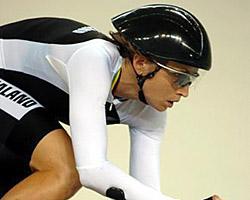
Recently on Cyclingnews.com |
Women's team pursuit - handle with care
It may go some way towards compensating trackies for the men's kilometre and women's 500 metre time trials being taken out of the next Olympics, but the UCI needs to be careful how it introduces new teams events into the next track world championships, reports Gerard Knapp.

|
The move by the International Cycling Union (UCI) to introduce new team-based track events at the 2007 world championships will need to be carefully planned in with existing schedules to avoid affecting the performances of track cycling's leading riders in their chosen solo events.
Generally, however, it seems the UCI's move to offer more track events has been generally well received, especially after the howls of protest last year when it nominated the men's one kilometre and women's 500 metre time trials to be axed from the Beijing 2008 Olympics, presumably to satisfy the International Olympic Committee's request to bring in BMX racing into the Olympics program.
In a meeting at the 2006 Road World Championships in Salzburg late last month, the UCI approved the introduction of three new events for next year's Track Cycling World Championships: the men's omnium and women's team sprint, as well as the women's team pursuit. Further, both women's team events will be added to the already crowded Track World Cup schedules in 2007-08.
While the men's omnium and women's team sprint are welcomed by the sprinters, it is the women's team pursuit that has excited many in road cycling, as it provides an opportunity for more stars of road to enter track events.
That's assuming the riders are interested. However, leading figures in track cycling, such as reigning Olympic champion and world record holder, New Zealand's Sarah Ulmer, who's also considered one of the strongest riders on the road, described it as "a great idea". Ulmer said "seeing what having a team pursuit does for the male endurance track cycling development in NZ, suggests that having a team event for women can only be a great way of encouraging more women into track cycling. Hopefully it will provide a good core of women who can then branch out and do individual events as well."
However, Ulmer was not certain it would necessarily tempt roadies on to the boards. They may have the strength and condition to contest the gruelling 3 kilometre event, but there is also a lot of somewhat hidden technique in riding at 'full gas' only centimetres away from other team riders. "I'm not sure if it will bring more road riders into track cycling - maybe after a while (and) once roadies see it running. But I can see it definitely being an attractive entry point for women to actually get into track cycling. Being part of a team is often a good selling point."
Who pays their way?

|
Kevin Tabotta, the high performance manager at Cycling Australia, said the country's leading track cycling coaches "weighed up the pluses and minuses of each of the possible options, and while we certainly acknowledge that having more events for women is good for the sport and good for the development of women's cycling, we have to remember that adding any extra events will mean extra people, extra equipment and extra money spent by nations to support it properly.
"Most countries prioritise on Olympic program events and Australia certainly must do so based on the funding it receives (from the Australian Sports Commission - ASC). However, we will look at how to best approach it and target the medals. This may impact on how well the new events are supported," he said.
The Australian track team dominated the Athens 2004 Olympics and this year it focused on the Melbourne 2006 Commonwealth Games, where once again it took out many events, somewhat at the expense of its performance in Bordeaux at the world championships, with the exception of its young men's team pursuit squad, that secured gold against favourites Great Britain. The Australian coaches know they have to chase the high-profile events every two years to keep the funding dollars flowing, so adding more events almost always equals more expenditure.
Tabotta said, "The pluses are that you can now find a way to introduce new elite talent to the track, especially in countries where an athlete has dominated an event for many years and there are limited starters in events like the points race."
"The [women's] teams pursuit may provide a good way to expose new athletes to world championships, until [they are] ready to challenge for the limited spots available in individual events," he said. Tabotta pointed out that the women's team sprint has been on the calendar in track world cup rounds, but, "the challenge will be to see how the UCI adds these events into the [world championships] program, but still allow sprint women and endurance women to be able to pursue more than one or two events."
He gave the example of how Australia could start with champion riders like Katie Mactier and Katherine Bates in a three-rider team pursuit squad, plus one additional (or emerging) rider.
"But if the event falls before the IP [individual pursuit] or points race [at Olympic events], these riders and countries will be forced into decisions where they prioritise for the Olympic events."
Tabotta said that the Australian riders are judged by the ASC on Olympic events for any athlete support funding. "Programming is the most critical issue here. If the UCI place the women's TP and TS [team sprint] after the key individual Olympic and established Worlds events, such as individual pursuit, points, sprints plus Keirin and 500m time trial, I think it could be really well supported, as it will allow key riders to ride them..
"There is also a good argument to claim that the extra events boost numbers, boost depth and strengthens the Olympic events."
Ulmer is also aware of the potential financial challenges, but believes it may only be incremental. "I guess it could be more expensive, but I don't think that will be too much of a factor. If you are already sending two endurance girls to a track world cup, you'd only need a couple more, but it depends on how many women per team".
(So far the UCI has not told federations the exact details of this new event, but it's expected to feature three riders in competition and a total of four that can be used for qualifying.)
Who would be strongest?

|
In recent years, it has been the Australian and New Zealand women that have dominated the individual pursuit, with Mactier and Ulmer standing alongside each other on various podiums. However, at the 2006 Track World Championships, it was the USA's Sarah Hammer, a track cycling specialist, who took home the gold medal. (Mactier failed to qualify for the final, while Ulmer did not enter these championships.)
In fact, in 2005, USA Cycling trialed some of the country's strongest female road riders on the track in an effort to find a potential world-beater. As Cyclingnews diarist Kimberly Baldwin revealed in her diary, it was not the easiest transition, but the girls certainly showed promise.
In her diary entry, Baldwin wrote, "Kristin Armstrong looks to be the next promising U.S. pursuiter". Since that hit-out in 2005, Armstrong has concentrated on the road and in fact won the women's individual time trial in the 2006 Road World Championships while her team-mate, Christine Thorburn, secured the bronze, so it would seem that the USA could present a formidable squad, assuming the riders can accommodate the training and race schedule. Indeed, the USA could arguably present the strongest combination of riders, if not the most the experienced, and as Baldwin writes in her diary, it's not as simple as it looks.
Who do experts think would present a strong team? Multiple world and French track cycling champion Marion Clignet, said, "I should think that Germany, Australia, Switzerland, America, New Zealand, Russia, and the UK are countries that could already front competitive teams".
The reigning queen of the IP, New Zealand's Ulmer, whose stunning world record in the set in Athens 2004 still seems unbeatable, said, "I reckon NZ could put together a great team, too. We've got some awesome youngsters coming through now on the track, and coupled with some of the more experienced riders, plus the odd roadie, we could go OK."
"We also have an amazing schools team time trial series over here in NZ. We've just had our National Secondary School Champs and there were well over 100 teams entered. So it could be a good progression to go from one team sport on the road, to another team sport on the track. Being part of a team can be a way more attractive option for someone to get into a sport, as the schools program shows."
It seems it's not only the fans who like the teams events, whether they're on the track or on the road. As Clignet said, "The team time trial on the road is a hugely missed event for women as well. It would be great to bring it back."
Photography
For a thumbnail gallery of these images, click here
Images by Jonathan Devich/epicimages.us
- New Zealand's Sarah Ulmer is very positive about the introduction of the women's team pursuit to the track world championships and rounds of the track world cup.
Images by John Flynn/Cyclingnews.com
- Australian women have regularly raced the team pursuit in their respective state championships. Here, a squad in the Queensland state titles gets a feel for the flying formation.
Images by Mike Gladu/www.velodrome.com
- Sarah Hammer at speed in the 2006 Track world Championships in Bordeaux, France. The USA could arguably present the strongest combination, if not the most the experienced. USA Cycling has also been experimenting with putting leading female road cyclists, such as recently crowned world road time trail champion, Kristin Armstrong, on the track.
